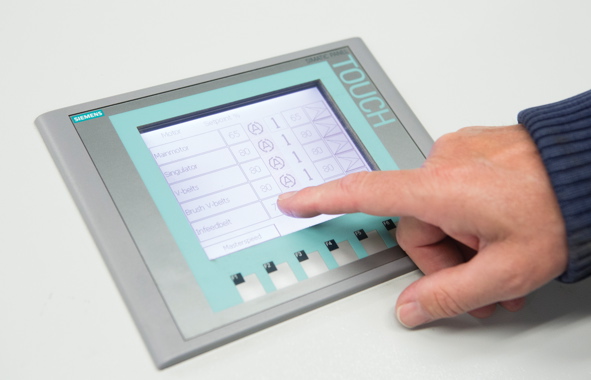
The princely sum of all parts – June 2015, Canadian Packaging
By Andrew Joseph, Features Editor; Photography by John Packman
Automation Design & Innovation Food Safety Binkley Apples Limited Canadian apple industry CHEP Canada Inc. GREEFA Lenze Americas Corporation Red Prince apples Siemens Canada Limited slideshow St. Joseph Communications|Content Group Vortex Packaging Niagara Inc.Ontario apple farm changing the way consumers purchase apples in grocery produce aisles with help of a multiple award-winning package design.
(Above) Binkley Apples Limited co-owners Irma and Marius Botden utilize modern farming techniques, such as high-density farming, to grow shorter, high-yield apple trees that allow for faster harvesting at its Thornbury orchards, helping it garner a whopping 15-percent market share in Ontario.
While not quite the perfection of the Garden of Eden, the innovative Binkley Apples Limited of Thornbury, Ont., has certainly found its higher level recently for the quality of its tasty products and of an award-winning packaging design capturing the minds of retailers and consumers alike.
Situated on the 44th Parallel, Binkley Apples is considered to be the most northerly apple-producing area in the Province of Ontario, which has been a hub of apple farming since the 1800s.
To this day, the region boasts about 4,000 acres of apple orchard which, surprisingly makes up a whopping 30-per cent share of the province’s total commercial apple acreage.
“What makes our region so special is the protective lake effect that occurs between the Niagara Escarpment and the deep cool waters of Georgian Bay.
“Moreover, the fertile strip between Escarpment and our section of Lake Huron is blessed with a microclimate that makes our whole area from Collingwood to Meaford ideal for growing apples,” Binkley Apples owner Marius Botden told Canadian Packaging during a recent interview.
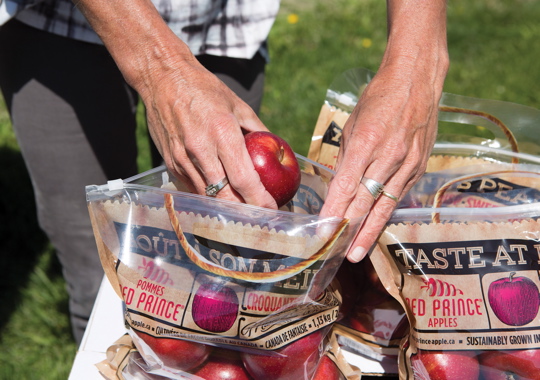
Designed by St. Joseph Communications|Content Group, the innovative reclosable plastic Red Prince apple bag provides excellent shelf appeal through optimal package transparency that lets the product speak for itself.
Founded in 1961 by Harold and Ada Binkley, Irma and Marius Botden purchased the orchard in August of 2013.
The Botdens owned Global Fruit, and had previously worked with Binkley Apples as their preferred packer and shipper, with its apples already being sold under the Binkley banner.
“We decided to purchase the Binkley Apples orchards and business as part of a strategy to essentially assure our retail and wholesale partners of our continued commitment to quality and service,” says Botden.
“Plus it was an opportunity to not only add to our fruit production but to become involved in the packaging segment as well.”
Originally from The Netherlands, the Botdens arrived in Canada in 2001 and began planning high-density orchards in 2004. At the time, the practice was fairly unique to the marketplace, but is something that apple growers everywhere are shifting to in a big way as a means to combat rising labor costs.
The high-density apple orchards utilized by the Botden’s involves the use of a trellis system, and an apple tree that is distinctly shorter than most, but one that actually produces more fruit.
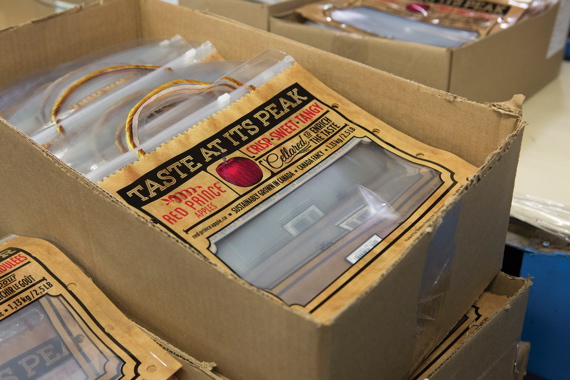
Binkley Apples has set aside 1.3 million of the St. Joseph Communications-designed 2.5 pound capacity reclosable plastic bags to hold the expected 2015 output of 85,000 bushels, or 3.4 million pounds, of Red Prince apples.
“Essentially, since the apple trees will remain small but heavy with fruit, the trellis system was installed to help hold them upright in the same manner that is utilized for grape vines,” explains Botden, noting the high-density apple trees don’t require as much pesticide application as others.
Equally vital, is the way the Botden’s workers tend and trim the trees that allows more sunlight to actually reach the fruit throughout its maturation process, which helps produce a better-quality fruit naturally ripened right on the tree.
In addition to producing a higher-density yield of fruit, they are also easier to pick, as the workers can pluck the fruit from the ground in a much faster and less backbreaking way.
“The downside, of course, is that these trees and their lower-hanging fruit are a target for wildlife, and are more susceptible to drought, so proper drip irrigation and fencing is required,” Botden relates.
By any measure, Binkley Apples is proof-positive that it is a successful concept helping make it a successful orchard.
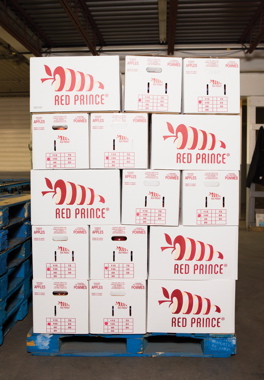
Binkley Apples utilizes corrugated cartons, manufactured by Moore Packaging, placed atop the signature blue pallets from CHEP for delivery to customers coast-to-coast in Canada as well as the U.S.
Situated on 700 acres with 900,000 apple trees annually producing 800,000 bushels, the company supplies the market with 32 million pounds of crispy, juicy goodness that are found in grocers across Canada from the Maritimes to B.C, and now into Michigan, with calls pouring in from various other locations requesting his products.
Botden refers to his year-round operation as a medium producer, but that’s a rather modest assessment.
The orchard has an approximate 15 percent market share—gathering apples from its own farms, and other local concerns producing mostly medium to large apples of multiple varieties. These include Red Prince, Ambrosia, Honeycrisp, Gala, Golden Delicious and McIntosh, in addition to bushels of Cortland, Crispin/Mutsu, Empire, Idared, Jerseymac, Northern Spy, Paulared, Red Delicious, Russet and Spartan apples.
“Consumers have gravitated towards the Red Prince apple in a major way,” relates Botden.
The Red Prince, a pure red apple variety that is a natural cross between a Red Jonathan and a Golden Delicious, is considered first true winter apple.
The apple is harvested in the late fall, but because it is quite tangy at that time, it is placed in a cold storage facility on the farm for three months to balance the apple’s natural sugars and acids. The process creates a sweet, tangy apple that is both crisp and juicy.
“We actually place the Red Prince apples in a temperature-controlled facility, and draw out a large percentage of oxygen to replace it with CO2 (carbon dioxide), basically putting the apple to sleep,” explains Botden. “It’s a similar procedure for wine, except instead of grapes we’re doing it with this variety of apple.”
The Red Prince was first grown in The Netherlands back in 1994, with the Botdens growing it there on their farm.
Today, the Botdens actually own the exclusive rights to grow and distribute the Red Prince apple in North America.
“One major retailer told us this apple now competes wit their third-fastest selling apple in the chain,” reveals Botden, adding that Binkley Apples receives constant direct feedback from its customers about what they love about the apple and its packaging.
“Another chain said it is now their best-performing apple from January to summer.”
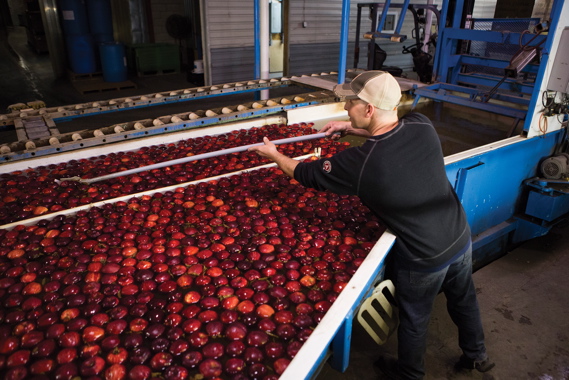
Performing quality assurance, a Binkley Apples employee removes apples from within the wash point to check for consistent pressure brix and internal quality to ensure the proper sugar content, crispness and flavor.
The busiest time for any natural farm is typically in the autumn, and Binkley Apples is no different—ramping up is production to two shifts a day, seven-days-a-week.
In the winter, the orchard gets by on just five employees, but during the spring and summer, it hums along with 80 workers, ripening into a robust payroll for 240 employees during the fall harvest.
“Our packing plant runs along with 24 people during our season low, peaking at 45 employees during the season high,” Botden relates.
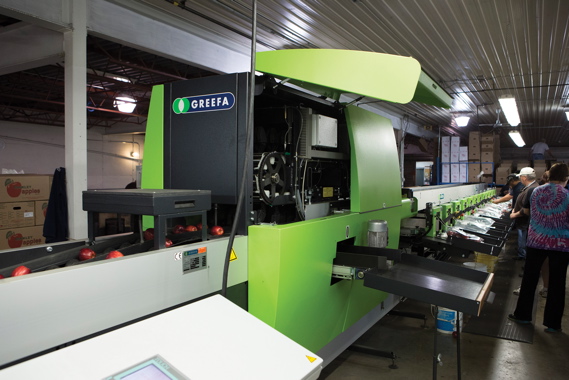
Binkley Apples uses the globally-renowned Dutch-built GREEFA GeoSort grading machine specifically designed for soft-fruit analysis to ensure product quality is consistent for its customers and consumers. The GeoSort is easily controlled by a Siemens Simatic Touch (below) operator control panel touchscreen.
While the traditional manner of purchasing apples at a grocery store has been to pluck apples from the various bulk trays in the fresh fruit aisle, Binkley Apples provides consumers and customers with a wide variety of packaging formats:
•
tray-packs of 113, 100, 88, 80, 72, 64 and 56 apples per case;
•
three-, four-, five- and eight-pound clear polybags;
•
Euro boxes;
• two- and three-layer RPCs;
•
display-ready cartons;
•
gift-packs, and;
•
the Red Prince bags for 2.5-pounds of Red Prince apples only.
Each reclosable plastic bag contains 1.13 kilograms of the sustainably-grown Red Prince, and only Red Prince.
Boasting a dominant clear window to show off the fancy-grade apples, the plastic bag looks like a kraft paper shopping bag complete with a rope handle, thanks to some fancy graphic manipulation designed by the Toronto-based St. Joseph Communications|Content Group.
The bag’s design also includes a high-quality PTC (press-to-close) resealable closure that runs along the upper area. Above all, the folks at Binkley Apples were really impressed with the stand-up footprint of its bottom layer that really grabbed the consumer’s eye.
First used by Binkley Apples this past January, it has quickly created dramatic product differentiation to build fast-growing brand recognition in the retail marketplace.
“Even though we only began shipping in January of this year, this bag has helped vault our sales to new heights, surpassing any of the previous year sales history,” says Botden.
“But that initial run we had in January, was only a trial,” he recalls, “and we wanted to see if it could maintain the sales levels with repeat sales—and judging by the consumer feedback we have been receiving, it has surpassed all expectations.”
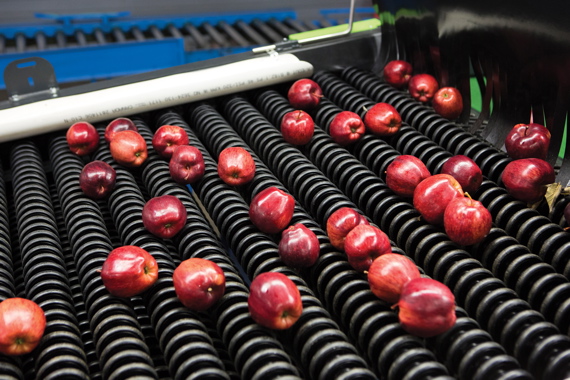
Apples move along a sorting chain on a Greefa GeoSort grading machine. Binkley Apples uses rigorous automatic and manual quality control measures to ensure consistent grading and sizes.
If winning awards still counts for anything, then the Binkley Apple Red Prince bag can count by twos: as it was a double winner at the 2015 PAC – Packaging Consortium Global Leadership Awards held earlier this year.
Designed by St. Joseph Communications|Content Group, the Red Prince Apples bag took home the Applied Arts Design and Craft Award supplied by Applied Arts Magazine, as well as the Canadian Packaging Consumer’s Voice Award sponsored by this magazine.
The double win marked the first time in the award’s competition that the top two Best of Show awards were won by the same company.
Although Binkley Apples does sell large quantities of bulk apples, Botden acknowledges that it is difficult to educate the consumer on the full Red Prince apple experience—sustainability, quality, consistency and taste—via the confines of the bulk produce bins.
“After we had conducted focus groups on the consumption of apples, we were better able to understand the confusion consumers were having regarding the packaging already out in the marketplace,” relates Botden.
“So we partnered with St. Joseph Communications to help remove the communication of what exactly the consumer is purchasing.
“The response has been a unanimously positive acceptance from every retailer and every consumer that has been in touch with us,” beams Botden. “The patented bag design really gives us a unique look on the shelf.”
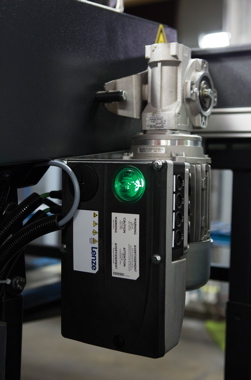
A conveyor system feeding the GeoSort grader is powered by servomotors manufactured by Lenze America.
Printed in China via Vortex Packaging, Botden says it was important that the paper-looking plastic bags actually be recyclable. Though originally purchased in 2007 to design plastic packaging and promote the sale of Niagara-grown fruit through improved retail packaging, Vortex Packaging has since expanded its geographical market by servicing customers like Binkley Apples.
The production facility at Binkley Apples, including its 4,400-square-foot cold storage rooms, is packed with various machinery.
Traveling on two infeed flume lines, the apples are directed through sizing and grading equipment, before being further divided to 12 different single one-pack packing stations, each for the varying apple colors, sizes and packaging specifications.
For quality assurance purposes, Botden notes that “Each case of apples can be traced from our packing facility to the individual grocery store, and backwards to the farm and the block from which it was grown.
“We’re still a semi-automated business, and we’re always looking to become more automated where possible,” states Botden. “I know that in order to do the same volume of production by hand, I’d need to have at least 150 employees in the packing plant.”
So far in 2015, Binkley apples has installed a new Dutch-built GREEFA GeoSort grader, designed for handling soft fruits featuring a Siemens Touch Simatic panel operator touchscreen, and is currently in the process of installing a new IT program custom-built for it by a Canadian partner.
The entire packaging line at Binkley Apples is, according to Botden, integrated with an advanced computerized traceability system that allows it to track the apples from the orchards to the customer’s shelf. Botden points out that all bin lots are traced throughout the system as apples enter the waters of its flume.
“Customer safety is always high on the agenda, which is why we have our PrimusGFSI Food Safety Certification,” says Botden, citing the GFSI (Global Food Safety Initiative), a globally respected and accepted food industry organization.
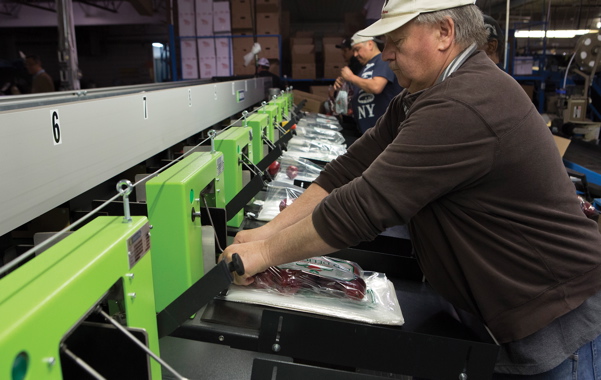
After the pre-determined numbers of apples are automatically deposited in plastic bags, workers at the Binkley Apples production facility in Thornbury quickly apply a tie closure to each bag and place into corrugated cases.
Despite knowing it has a wonderful product in its Red Prince apples and other varieties, Botden says that Canadian apple industry is very competitive, especially competing with the number of imported apples that are brought in.
“These imported apples have the benefit of lower taxes and wage rates relative to our Canadian standards,” says Botden. “So in order to compete successfully, Binkley Apples has to constantly ensure it only releases high-quality products that pass the muster on food safety.
“But of course, we also have to match out customer service targets while maintaining an equilibrium with pricing,” he acknowledges.
Botden says the high-density farming techniques used at Binkley Apples is one way to combat foreign competition, “it’s also the ability to provide consistent quality and taste.
“But along with packaging flexibility and innovation, we’ve carved out a nice share of the market.,” Botden sums up.
“And, with inquiry calls coming in from various areas south of the border, our apples will be in the red for a long time yet.”
Advertisement


